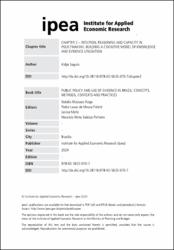Please use this identifier to cite or link to this item:
https://repositorio.ipea.gov.br/handle/11058/14269Full metadata record
| DC Field | Value | Language |
|---|---|---|
| dc.contributor.author | Saguin, Kidjie | - |
| dc.coverage.spatial | Brasil | pt_BR |
| dc.date.accessioned | 2024-07-09T19:41:29Z | - |
| dc.date.available | 2024-07-09T19:41:29Z | - |
| dc.date.issued | 2024 | - |
| dc.identifier.citation | SAGUIN, Kidjie. Intuition, reasoning and capacity in policymaking : building a cognitive model of knowledge and evidence utilisation. In: KOGA, Natália Massaco (Org.). Public policy and use of evidence in Brazil : concepts, methods, contexts and practices. Brasília, DF: Ipea, 2024. p. 73-945. DOI: http://dx.doi.org/10.38116/978-65-5635-070-7/chapter2 | pt_BR |
| dc.identifier.uri | https://repositorio.ipea.gov.br/handle/11058/14269 | - |
| dc.description.abstract | Aborda a advertência da administração pública comportamental sobre a falta de micro fundamentos de tomada de decisão. O capítulo procura reacender o interesse pela “psicologia da formulação de políticas” examinando as dimensões cognitivas do uso de evidências. Ao fazê-lo, retoma o discurso fundamental iniciado por Herbert Simon e Harold Lasswell no nascimento das ciências políticas sobre o papel da evidência científica em um processo político de outra forma confuso, oferecendo um modelo de uso de evidência baseado em um modelo simplificado. compreensão de dois importantes processos cognitivos: intuição e raciocínio. | pt_BR |
| dc.language.iso | en-US | pt_BR |
| dc.publisher | Instituto de Pesquisa Econômica Aplicada (Ipea) | pt_BR |
| dc.title | Intuition, reasoning and capacity in policymaking : building a cognitive model of knowledge and evidence utilisation | pt_BR |
| dc.type | Capítulo de Livro | pt_BR |
| dc.rights.holder | Instituto de Pesquisa Econômica Aplicada (Ipea) | pt_BR |
| dc.source.urlsource | http://www.ipea.gov.br | pt_BR |
| dc.location.country | BR | pt_BR |
| dc.description.physical | p. 73-94 | pt_BR |
| dc.subject.vcipea | IPEA::Política Econômica. Política Social. Planejamento::Política Econômica::Planejamento Econômico::Políticas Públicas | pt_BR |
| dc.subject.vcipea | IPEA::Quadro Institucional::Governo. Administração Pública::Administração Pública::Administração Pública | pt_BR |
| dc.rights.license | The reproduction of this text and the data contained therein is permitted, provided that the source is acknowledged. Reproductions for commercial purposes are prohibited. | pt_BR |
| dc.subject.keyword | Política Baseada em Evidências | pt_BR |
| dc.relation.references | https://repositorio.ipea.gov.br/handle/11058/14028 | pt_BR |
| ipea.access.type | Acesso Aberto | pt_BR |
| ipea.rights.type | Licença Comum | pt_BR |
| ipea.englishdescription.abstract | This chapter addresses the admonition of behavioural public administration about the missing micro-foundations of decision-making. The chapter seeks to reignite the interest on the ‘psychology of policymaking’ by examining the cognitive dimensions of evidence use. In doing so, it harps back at the fundamental discourse started by the likes of Herbert Simon and Harold Lasswell at the birth of policy sciences about the role of scientific evidence in an otherwise messy policy process by offering a model of evidence use grounded on a simplified understanding of two important cognitive processes: intuition and reasoning. | pt_BR |
| ipea.researchfields | N/A | pt_BR |
| ipea.classification | Administração Pública. Governo. Estado | pt_BR |
| Appears in Collections: | Administração Pública. Governo. Estado: Capítulos de Livros | |
Files in This Item:
| File | Description | Size | Format | |
|---|---|---|---|---|
| Public_policy_CAP_02.pdf | 304.79 kB | Adobe PDF |  View/Open |
Items in DSpace are protected by copyright, with all rights reserved, unless otherwise indicated.

